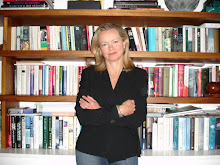
"BBC Eurovision host Graham Norton was nowhere near the protest and is totally unharmed” (Irish on-line forum)
I’ve been very busy lately but I couldn’t really tell you what it is I have achieved. I suppose I’ve been mostly busy with life minutiae – you know the sort of stuff: sick spaniels, laundry, being the executor of my late Father’s estate and the rest of all that bereavement baggage (separate post coming eventually – I know, bet you just can’t wait…) last minute commissions just a little too lucrative to turn down, laundry, lovelorn girlfriends, scrubbing the house as it goes on the market and, you’ve guessed it, yet more laundry.
I’ve been so busy that I haven’t had a minute this month to fulfil my regular commitment to a U.S. database, who pay me very nicely to read and abstract foreign language arts magazines for their website. It’s my favourtie gig. Interesting, informative, stimulating and, as a bonus, the (UK) Cambridge-based editors with whom I work – if only virtually – are a lovely, professional bunch.
So, on Saturday afternoon, I sat down with the express intention of completing a few records. And then I got distracted. Yes, hands up, by Twitter, but I hadn’t been terribly attentive or active for ages and wanted to ensure I knew what was going on in the Twitterverse, ahead of Media140 in London on 20th May with which event I’ve been lucky enough to be just a little bit involved.
These are just a couple of the things I did, courtesy of Twitter and Twitter pals IRL and otherwise, on Saturday afternoon alone. I heard within minutes about the Texas earthquake from the must-follow @JimMacmillan. Not a big one at 3.3 apparently but unusual for Texas. I also discovered the #earthquake Tweet stream which is bizarrely compelling. I was able to follow the latest on the Twitter #fixreplies saga via @JamesRivers and read a top think piece on the emergence of Social Network Revolt from @mashable.
I learned about the great #UnderAPound #Under2Bucks initiative started by @DarenBBC which is just the kind of TwitterLove project/meme which particularly appeals to me. Thanks to @Carole29, I was alerted to a link which let you watch the space walk live. I am no geek but a live space walk! How far is that from 1969, when my parents made us sit down in front of a tiny monochrome TV to see Neil Armstrong take his small/big step.
Courtesy of @tristamsparks I found out all about the #freejeanfer #escandologt campaign. If you haven't heard about it, I recommend you do so. I’d been trying all week not to get bogged down with daft #eurovision tweets but then saw this one from my friend IRL @Danoosha, "#Eurovision: gayest event in European calendar in Europe's most homophobic country. I predict a riot" http://tinyurl.com/qdqkgb
I’m not gay – although many of my close friends are and I suppose I have kept a vague watching brief on HIV/Aids related issues since my late brother, Rory, died in 1995. I didn’t even know that activists, including Peter Tatchell, a brave bloke whatever you think of his motives, were planning to stage a protest ahead of the Eurovision Song Contest. Russia decriminalised homosexuality in 1993 but the gay rights situation remains dire. Moscow’s influential mayor Yuri Luzhkov has described homosexuality as satanic. Then I found @PeterTatchell’s Tweet Stream which included such perfect succinct tweets as the following: “Arrested. Shortest march I've ever been on” and the last tweet at 12.26 on 16th May: “Free from police station but am deeply worried about Slavic Pride organiser Nikolai Alekseev. Haven't heard anything since his arrest”
As I continued trying to do a bit of remunerated work, I drifted back to Twitter and became more and more anxious about the lack of news about the Moscow arrests. Searching #Eurovision merely unearthed Euro-Tweeps’ preparations for camp parties with a few blatant attempts to secure votes for particular countries. Then I started to check MSM, starting with the BBC who were running huge coverage of the event itself. Much anticipation of whether Graham Norton could adequately fill the shoes of his countryman Sir Terry Wogan but on the protest and the arrests? Nothing whatsoever.
On Google, pratically nothing but the wire services’ anodyne round-ups of which the English-language Russia Today turned out to be both the most neutral and the most comprehensive. On Twitter, I found a previously undiscovered country of (mostly) sober and serious LGB voices, tweeting either as individuals or from collective platforms. Via one of these, I found a link to UKGayNews which had by far the most up-to-date news.
The story is still moving with one detainee, US activist Andy Thayer completely off the radar for several hours. I’m still struggling to find anything breaking but have definitely given up on the BBC. This morning, Radio 4 news at 9.00 am ran a soundbite with the Norwegian violinist who won Eurovision, admitting that he really couldn’t sing but the bulletin mentioned nothing about the arrests. “Openly gay” host Graham Norton reportedly said something along the lines of: “heavy handed policing spoiled (sic) a grand Eurovision”. I’m still trying to work out whether this line on an Irish on-line forum was serious or supposed to be funny: “BBC Eurovision host Graham Norton was nowhere near the protest and is totally unharmed”.
Looking forward to debating this and many other key issues: #whithertwitter, the changing face of news gathering and the citizen journalist at Media140 on Wednesday 20th May. Hope to see you there.
Stop press: this tweet from PeterTatchell "Glad everyone was freed eventually, though Nicholas & others face police charges. On my way home to London now.... I need a holiday" (c.1115 hours Monday)-






